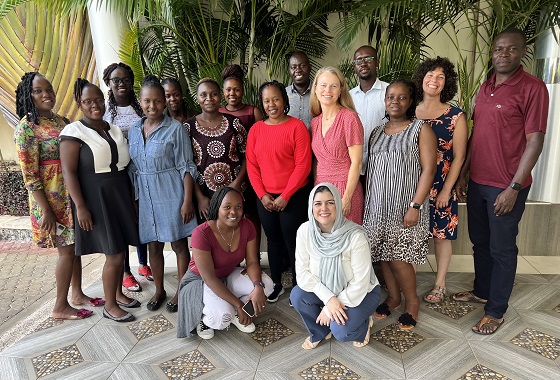Contraception
June 11, 2025
Lisa Orii receives Global Innovation Fund Award to integrate AI in app-based person-centered contraception services in Kenya
Categories: Awards, Certificate Program, Contraception, Family Planning, Research, students
 Congratulations to Lisa Orii, PhD candidate in the School of Computer Science & Engineering and Global WACh Graduate Certificate Program, for receiving a 2025 UW Global Innovation Fund Award. The fund supports transformative cross-college, cross-continent research collaborations and global Husky learning experiences at UW.
Congratulations to Lisa Orii, PhD candidate in the School of Computer Science & Engineering and Global WACh Graduate Certificate Program, for receiving a 2025 UW Global Innovation Fund Award. The fund supports transformative cross-college, cross-continent research collaborations and global Husky learning experiences at UW.
Lisa will work with researchers at UW and Kenya Medical Research Institute (KEMRI) on a project titled, “Co-Design of Chatbots for App-Supported Person-Centered Contraceptive Decision Support among Adolescent Girls and Young Women in Kenya in the Pharmacy Setting.” The research team includes Drs. Elizabeth Harrington (UW Global Health and Obstetrics & Gynecology), Elizabeth Bukusi (KEMRI), Serah Gitome (KEMRI), and Richard Anderson (UW Computer Science & Engineering). (more…)
February 15, 2024
New project aims to expand access to sexual and reproductive health care in South King County
Categories: Awards, Contraception, Family Planning
December 29, 2022
Mobile WACh Empower trial, aimed to evaluate SMS-based reproductive health counseling intervention among women living with HIV, launches in Kenya
Categories: Awards, Contraception, Family Planning

Mobile WACh Empower study team members from UW Global WACh and Kenyatta National Hospital in Kenya (Credit: Alison Drake)
On December 1st, the Mobile WACh Empower randomized clinical trial launched in 10 sites in Kenya. In this trial, the study team aims to assess whether a digital, self-administered reproductive life planning counseling tool given to women living with HIV (WLWH) at baseline and continued counseling support through the unique two-way Mobile WACh SMS platform that combines automated bulk SMS messaging and dialogue with a health care provider (the foundation for several former and ongoing Global WACh studies using mobile health technology) can reduce contraceptive discontinuation, improve dual contraceptive use, and help women plan for healthy pregnancies. This innovative intervention was developed though stakeholder engagement in workshops held with WLWH, health care providers, and policy makers in June and November 2022. The intervention is designed to reduce the burden for health care providers to offer reproductive counseling, tailor reproductive life planning counseling for a range of needs, and importantly, support women as their needs change over time. (more…)
New study will develop novel approach to measure fertility intentions among Kenyan women
Categories: Awards, Contraception, Family Planning

Closeup of pregnancy test and contraceptive pills birth control concept
Measuring fertility intentions, which pertain to ideal family size and desire for additional children, is complex and may be influenced by contextual factors and culture, and beliefs held by individuals that drive their attitudes and behaviors. Most existing fertility intention scales are designed to classify women with binary measures, such as having an intended or unintended pregnancy, and do not allow for the spectrum of feelings that women might have, including ambivalent feelings about pregnancy. (more…)
February 3, 2020
Predoctoral Research Fellow, Claire Rothschild, receives NICHD fellowship award focused on women’s reproductive health in Kenya
Categories: Awards, Contraception, Family Planning, students
 Claire Rothschild, a third-year doctoral student in the Department of Epidemiology, received a National Institute of Child Health and Human Development (NICHD) F31 pre-doctoral fellowship to support her dissertation research on using mobile technology to improve family planning data and outcomes in Kenya. In collaboration with PATH-Kenya and Kenyatta National Hospital, Claire’s research focuses on better understanding when and why women discontinue and switch methods of contraception, with the specific goal of identifying factors that predict dissatisfaction and early discontinuation of contraceptive methods among women who do not wish to become pregnant. (more…)
Claire Rothschild, a third-year doctoral student in the Department of Epidemiology, received a National Institute of Child Health and Human Development (NICHD) F31 pre-doctoral fellowship to support her dissertation research on using mobile technology to improve family planning data and outcomes in Kenya. In collaboration with PATH-Kenya and Kenyatta National Hospital, Claire’s research focuses on better understanding when and why women discontinue and switch methods of contraception, with the specific goal of identifying factors that predict dissatisfaction and early discontinuation of contraceptive methods among women who do not wish to become pregnant. (more…)
May 15, 2018
The mCUBE study, funded by Grand Challenges Explorations, seeks to understand women’s contraceptive preferences and behaviors in Kenya
Categories: Awards, Contraception
Written by Alison Drake, Assistant Professor of Global Health, and Claire Rothschild, Epidemiology PhD student and mCUBE Research Assistant
As mobile phone ownership is rapidly growing around the world, crowdsourcing – asking questions to solicit information from large groups of people – is an increasingly attractive way to conduct global health research. In Kenya, nearly 90% of the population has access to a mobile phone,[1] and capturing data through mobile phones may provide a low-cost and effective solution for tracking health outcomes over time.
In 2017, Global WACh’s Dr. Alison Drake, Assistant Professor of Global Health, was awarded a Gates Grand Challenges Explorations grant to explore this idea – how mobile phones might be used to understand Kenyan women’s experience using family planning over time. Women and girls face major challenges using family planning, including side effects, stigma, cost, and barriers to access. Overall, 1 in 3 women starting a modern method of contraception stop using it within 1 year, and over half stop within 2 years.[2] This phenomenon is called the “leaking bucket”[3] in family planning coverage, making efforts to achieve universal access to family planning worldwide extremely difficult.
In partnership with PATH-Kenya, the Mobile Data Collection of Contraceptive Use, Behaviors, and Experiences (mCUBE) study is collecting information from Kenyan women using family planning in real-time through surveys distributed directly to their phone via short message system (SMS). The survey technology, developed by the Kenya-based mobile technology firm mSurvey, allows SMS questions to be personalized based on language, family planning method, and prior SMS responses.


Dr. Alison Drake and the mCUBE research team at a January 2018 training in Kisumu, Kenya
The team developed short and simple SMS surveys in four languages (English, Swahili, Luo, and Kisii) that could easily be completed in 5-10 minutes, and could capture important information on women’s experiences and challenges using family planning methods. This task was challenging, as SMS questions need to be clear and straightforward enough to ensure women can complete surveys on their own, but within a 160 character count limit. In some instances, when text is translated from one language to another, the length of the translated text can differ. The team consulted with members of the Global WACh Family Planning Working Group and staff from Global WACh’s collaborating institution, UW-Kenya, to further simplify questions as much as possible. The mCUBE study team enrolled participants from February 2018 to April 2018 from 10 public facilities across 5 counties in Western Kenya. A total of 1,270 women were enrolled, including 12% who didn’t have their phones at the time of enrollment and completed SMS registration remotely.

mCUBE Kenya Study Coordinator, Peninah Kithao, (right) meets with research assistant, Benard Otieno (left)
Once enrolled in the study and the SMS system, women receive weekly SMS surveys about their experience using family planning over the next 6 months. mCUBE is also using SMS to collect information about the health facilities where women and girls are seeking their family planning care. Together, this information can be connected to individual participants, providing insight into the quality of family planning services and the impact quality may have on family planning use and satisfaction.
We look forward to seeing the results of the study, with completion of follow-up anticipated in October 2018!
[1] http://www.ca.go.ke/index.php/what-we-do/94-news/366-kenya-s-mobile-penetration-hits-88-per-cent
[2] Castle S, Askew I. Contraceptive discontinuation: reasons, challenges, and solutions. FP2020, Population Council. 2016 [cited 12 September 2017]. Available from: <http://www.familyplanning2020.org/microsite/contraceptivediscontinuation>
[3] Jain AK. Fertility reduction and the quality of family planning services. Stud Fam Plann. 1989;20(1):1-16.
